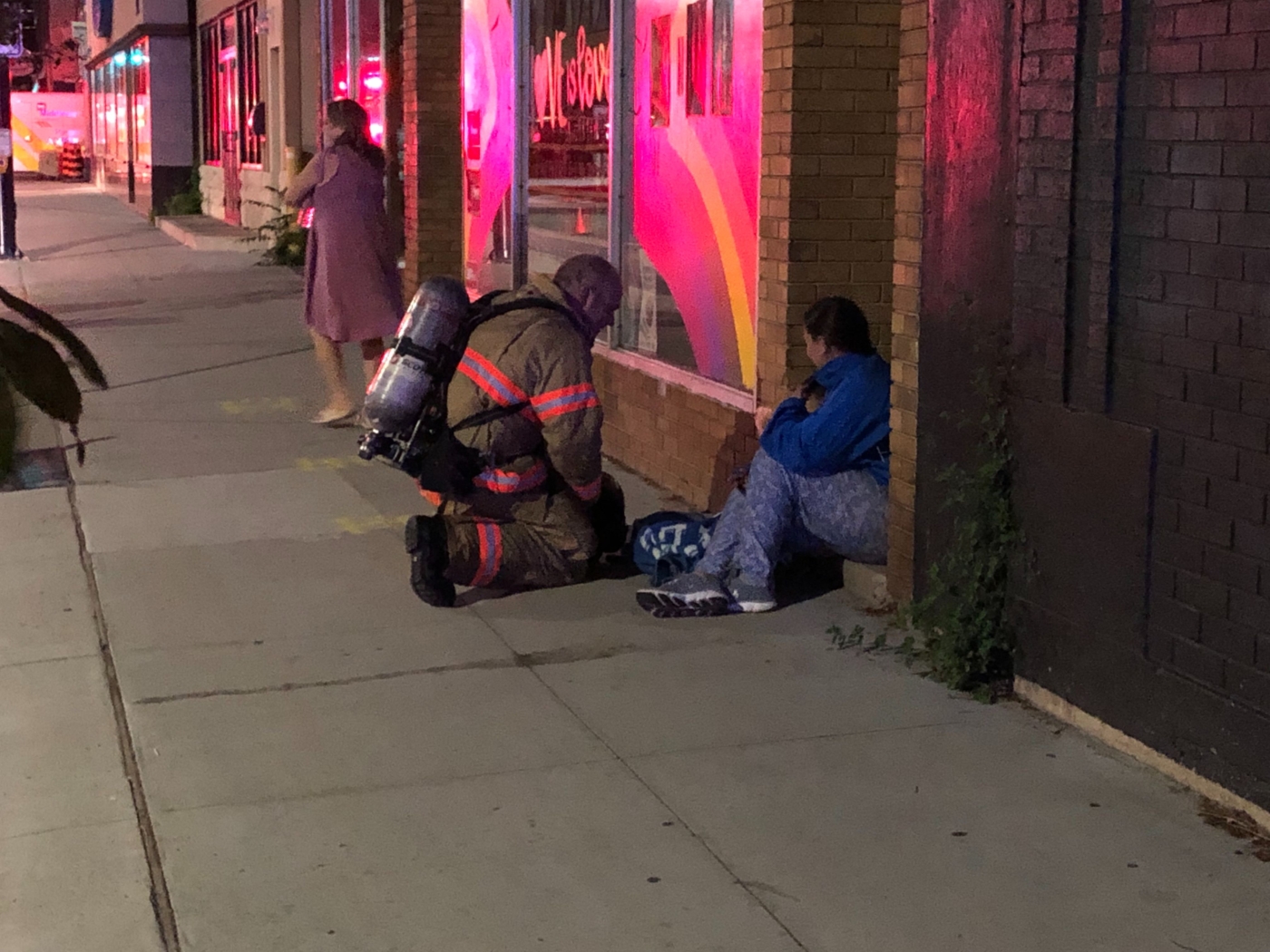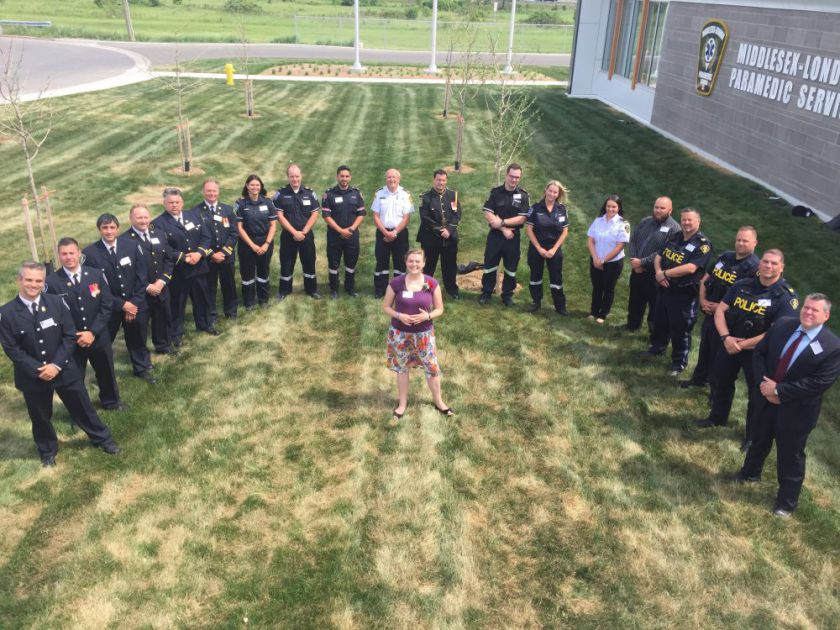Time can be the difference between life and death on Canada’s busiest highway. Ashlyn Krell found that out last February. So did the people who saved her life.
This is the story of the people who are among the best of us, the emergency responders and medical practitioners who devote their lives to saving others. It’s a story about the science that gives knowledge and faith that gives hope. And this is about Ashlyn – and her journey back to life.
Ashlyn Krell died.
There’s no question that for at least 27 minutes last February, along a stretch of the Highway 401, she drowned.
You wouldn’t know it, save for the small, pinkish tracheotomy scar at her neckline from her four weeks in a London hospital.
Otherwise, she’s still the same Ashlyn — a happy, loving, caring woman “eager to enjoy every day and see what there is,” she said with a ready smile and bright, dancing eyes.
Clearly, she’s not another grim traffic statistic claimed by Canada’s busiest highway. And as for that crash, which has now opened a path of infinite possibilities, Ashlyn doesn’t remember much — really, any — of it.
She doesn’t remember the skid off the icy road east of the Veterans Memorial Parkway overpass and her little blue car’s quick descent into the ditch.
Gone is the violent crash on the driver’s side into the exposed extension of a concrete culvert. The car flipping over into the deep construction hole filled with water.
Hanging upside down in her seatbelt. Cold water filling up the inside of the car. Darkness. People yelling at her to hang on.
The last things Ashlyn remembers on Feb. 12, 2017, are chocolates.
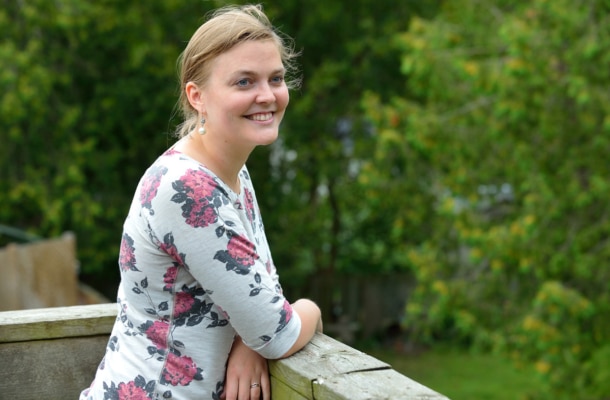
Ashlyn Krell. MORRIS LAMONT / THE LONDON FREE PRESS
At first, she wasn’t sure why they flashed into her memory bank. Later, she remembered she’d bought them at the Lindt chocolate store in Cambridge earlier that day as a gift for her younger brothers for Valentine’s Day,
“That’s pretty much the last thing I remember,” she said, her husband, Brayden Krell, sitting beside her on the sofa in the living room of their cozy London apartment.
She was so close to not being here. An incredible constellation of quick thinking, medical expertise and determination saved her life.
The stubborn first-responders who used their collective strength and kept hope alive. The first-class medical staff and facility ready to take on the challenges of her case. The stranger who dangerously stopped in the dark along the busy highway, but who did everything right after that to make sure Ashlyn’s rescuers would find her.
The love and support of a Christian family that never lost faith in her recovery.
For some months, The London Free Press has been re-constructing how Ashlyn was able to survive a harrowing night on Southwestern Ontario roads and a lengthy hypothermic submersion in icy water.
Over the next several days you will meet Ashlyn and her family, along with the police officers, firefighters, paramedics, medical staff and others who gave her back her life.
Ashlyn doesn’t remember what happened.
But they do.
“The 401 is very unforgiving,” said OPP Sgt. Calum Rankin, a veteran of working the highway.
“It’s a hard taskmaster. It teaches you well, it teaches you hard. If you’re not careful, you’re going to be a victim of it.”
Ask any police officer who has cut their teeth patrolling Canada’s busiest highway — speeders, impaired drivers, jackknifed trucks and ferocious, heartbreaking crashes are their bread-and-butter on the ribbon of road snaking across the province.
The weather and the road conditions can change in what seems just a heartbeat.
Feb. 12, 2017, was one of those nights that would teach them all a new lesson in courage.
But it all started as a fairly routine night, save for the rain that was pelting down, when OPP Det. Peter Reintjes climbed into the marked SUV at the London detachment at 6 p.m. to begin his 12-hour Sunday night shift on patrol.
For me . . . it was just going to be just another normal Sunday night.
OPP Sgt. Calum Rankin
This was a welcome change of pace. Sgt. Perry Graham, his longtime colleague and friend, had asked he and Const. Emad Haidar to shore up his and Rankin’s understaffed platoon for some extra coin.
Reintjes, a 21-year OPP veteran and a decorated Canadian Armed Forces reservist, served Canada in the former Yugoslavia, Afghanistan and Iraq. He jumped at the chance to step away from his normal duties on the drug squad to get back out on the road.
Reintjes is an admitted adrenaline junkie. His work in uniform, both as a soldier and a cop, has taken him to some of the most dangerous situations imaginable in hot war zones and exposed him to some of the darkest tragedies on the beat.
“I’ve seen a lot of death — way more than anyone needs to,” he said. “Like a lot of people in this business.”
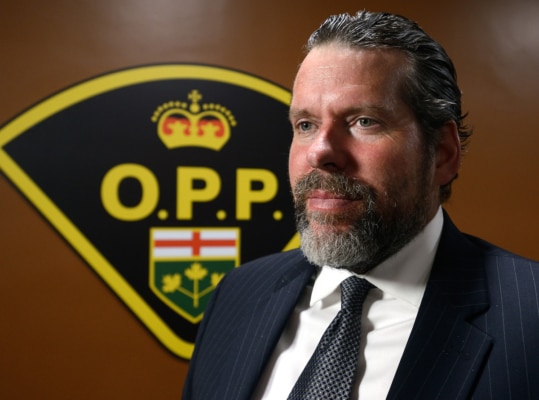
Det. Peter Reintjes. MORRIS LAMONT / THE LONDON FREE PRESS
It had been a sloppy weather day when Reintjes got into the SUV, a bigger vehicle that could handle his bulky frame.
Haidar, who worked with Reintjes on RIDE programs to check for drunk drivers on cold winter nights, had fired up a cruiser. The young father had been picking up as much overtime as he could swing, “trying to get things taken care of” for his family.
He wasn’t surprised that he and Reintjes has been tapped to help out. “Not many people like standing out in the cold. Pete and I are always out there,” he said.
Haidar is a contrast to the gung-ho Reintjes — quieter, introspective, a deeply faithful Muslim man — but like Reintjes, fearless when it comes to the worst of situations.
By the end of the shift, the grizzled vet Reintjes would share a special bond with Haidar, Graham, Rankin and the rest of the platoon.
But for that first hour, it looked like it was going to be just another typical night on the road. There was no forecast for the deteriorating weather conditions that would swoop in so quickly that night, said Rankin,
“For me . . . it was just going to be just another normal Sunday night.”
Earlier that day, Ashlyn had kissed Brayden goodbye before heading to Waterloo to visit her two younger brothers at her parents’ house.
Dustin, 23, and Dylan, 20, needed a home-cooked meal and a check-in from their big sister while they were on their own at home. Their parents, Gord and Sharon Skopnik, were in Uganda, near its border with South Sudan, working with war refugees as part of a Christian mission.
This had been their way of life since the Skopniks both graduated from bible college. All four of their children were born overseas while they did their faith-driven work.
Ashlyn’s sister, Alyssa, and her husband, Andrew Stapley, had begun their own missionary work in Botswana that same month.

London Free Press
With everyone overseas, the blue Toyota Corolla that was in dad’s name was lent to Ashlyn and Brayden for the year.
It was a welcome addition to their lives in London. That Sunday, Ashlyn settled into the driver’s seat and headed east with plans to return to Brayden later that night.
That evening, before leaving her brothers, she sent Brayden a text message at about 8:30 p.m. that she was on her way home.
With that, she tucked the cellphone into a wallet and pushed it deep into her purse, part of her commitment to never let her cellphone distract her while driving.
Without warning, at about 7:30 p.m., it felt as if the temperature had nose-dived.
The wind picked up, making it feel colder than what the thermometer showed. A cold front turned the heavy rain that fell all day into ice and snow, most severely along the 15-kilometre Middlesex County snippet of Hwy. 401 on London’s outskirts from the Putnam Road to Wonderland Road cutoffs.
Drivers heading into the area wouldn’t know what hit them when that curtain of precipitation — everything from rain, to snow, ice and fog — came down near the county line.
All that weird weather swiftly turned the roadway, everyone said, into a skating rink.
“You could have measured the thickness of the ice,” Graham said. “It would be nothing to strap on a pair of ice skates and be able to skate on the pavement.”
The heavy rains of the mild winter had washed away the salt or sand deposited earlier to keep drivers safe.
That night, the ice built up so quickly, that by the time the snowplows and salters were on the road, “the layer was there and it just kept freezing . . . It just wasn’t keeping up with it.”
Graham, a mountain of a man who’d worked as a cop for almost three decades, marked the weather change and temperature drop in his duty book and braced himself for what was coming — and “it quickly went downhill.”
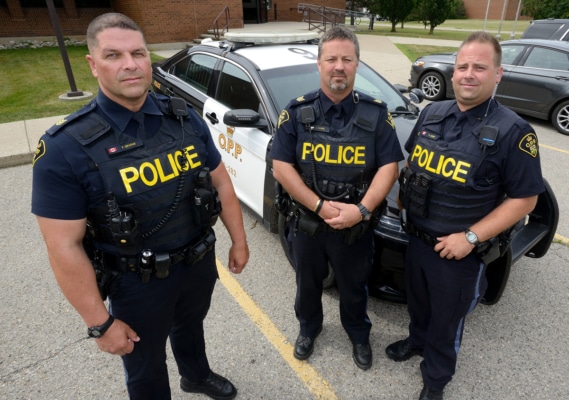
From left to right, Sgt. Perry Graham, Sgt. Calum Rankin, and Const. Alex Soucie at OPP headquarters. MORRIS LAMONT / POSTMEDIA NEWS
The calls to 911 dispatch started in a steady stream — cars skidding off the road or hitting the barrier walls, transport trucks jackknifing — with all officers working from crash to crash, assessing damage and, thankfully, finding only minor injuries before moving onto the next.
But the driving conditions were so treacherous, each call took time. “I know that even that night when responding to that collision, doing 40 km/h, that was stretching it because you’re starting to slide,” Graham said.
As dangerous as it was, lots of drivers ignored the ice and sped along, putting themselves and others in grave danger. “We were going lights-and-sirens to a lot of calls that we were getting and people were driving by us . . . There’s no way you could be going 100 on that road in those conditions,” Haidar said.
Reintjes said the night ranked in the top-three worst nights he’s ever driven the 401.
As always, he was keen. The first call he grabbed was on the 401 near the OPP’s Exeter Road police detachment near the Wellington Road interchange, where a pickup truck had spun and sideswiped a bus, crushing the truck’s passenger side. The driver and his two-year-old child escaped with minor injuries.
But after finishing up, Reintjes was growing impatient for more substantial work.
“I was the overtime guy . . . I was sort of the float . . . Everywhere I went, I was out of position for every call. Someone else got there first.”
With each call, Reintjes would tear over to the scene, only to find himself at the back doing traffic control. “I was thinking in my mind they might think I’m loafing because I haven’t taken the “I” (initial officer) on anything yet.”
By 9:30 p.m., the call volume was peaking. Graham and Haidar were corralling five tractor-trailers up the westbound Dorchester Road off-ramp that were stuck spinning their wheels on the ice and unable to make the steep climb.
While they waited for tow trucks, Graham called for more help with traffic control because cars were starting to back up on the highway. Reintjes picked up the request and sped east. “I was driving out there as fast as I could at the time — about 110.”
He believed he was going as fast as he could safely go.
“I’ve got a lot of driving experience — a lot,” he said.
Besides the police vehicles he’s driven up and down the 401, he’s taken the controls of practically every other kind of vehicle — cars, motorcycles, an armoured personnel carrier, army jeeps, an army truck, a garbage truck, boats, skid steers, tractors, an airplane and, once, even a helicopter.
“The pilot told me I was flying, but who knows,” Reintjes said, laughing.
He had his emergency lights on and was heading east in the left-hand fast lane “and some guy passed me on the inside doing a buck-twenty-five, a buck-thirty.
“I couldn’t believe it. It actually took me a while (to catch up) I got the sweats trying to catch him because I was nervous,” he said.
Reintjes passed the Dorchester Road cut-off as he closed in on the speeding driver.
“I pulled him over and he’s oblivious . . . I remember yelling, ‘I’m not out here trying to slow you down. I’m going to an emergency call as fast as I think is safe doing it and you passed me.’”
Reintjes ordered the man, who was on his way home from Chicago, out of the car. Reintjes had no intention of writing him a ticket, but he told him to “wiggle your feet.”
The man, who was already taken aback, scraped his foot on the icy shoulder and immediately started to slide.
“He said, ‘Officer, I don’t know what to say.’ I said, ‘I know, there’s a half-inch of ice out here.’”
The contrite driver was sent back on his way, “but because I stopped him I missed my ramp,“ Reintjes said.
By the time he looped back, Graham radioed that the Dorchester Road call was cleared up. Reintjes took the next call, a simple one, to help an American driver stopped on Westchester Bourne, just north of the overpass bridge.
It was just a flat tire. Reintjes stayed with the driver and waited for the tow truck.
Stopping along a busy road in the dark, especially the nation’s busiest highway, is wrong. But he did everything right.
Tim Wiechers was one exit away from finally getting off that mess of a highway and heading home.
The last part of his two-hour drive had been a white-knuckler as he guided his car along the slick westbound lanes toward his cut-off at Veterans Memorial Parkway in London.
The soft-spoken, unfailingly polite 26-year-old Londoner was driving back from Richmond Hill after visiting his girlfriend Marcela Ahumada, a law student at York University’s Osgoode Hall, to be back in time for classes the next day at Western University where he’s completing a masters geography degree in urban climatology.
Wiechers was glad to be getting off the 401. “It was a gross night,” he said.
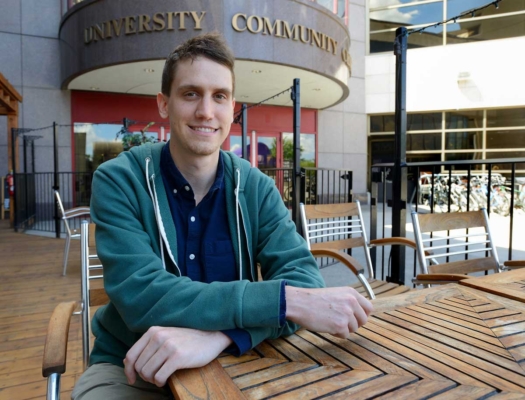
Tim Wiechers MORRIS LAMONT / THE LONDON FREE PRESS
A blue Toyota Corolla, about 30 to 50 metres ahead of him in one of the centre lanes, made a sudden and scary 45-degree turn to the right and was skidding off the road.
“I looked up and I saw this car going into the ditch.” Then it disappeared down the steep side of the road.
Wiechers drove past and quickly pulled his car over to stop. For a moment, he sat there wondering whether what he’d seen was real. He pulled out his cellphone and called 911 to report that the car was gone off the highway.
Then, he thought he’d better call his mom, Brenda, and tell her he was delayed.
“When you’ve raised your children right, they call 911 and mom,” she would say months later.
Brenda Wiechers is a trauma nurse with decades of experience. Her son let her know he was parked on the shoulder.
“I’m not really exactly sure what to do here,” he told her.
Her advice was to get out and go see if he could help anyone in the car. Wiechers kept her on the phone as he got out in his shirt-sleeves and ran down the ditch.
There, he saw the impossible. To his amazement, the little car was upside down in a small, deep pool of water that had collected beside a new concrete culvert.
I looked up and I saw this car going into the ditch.
Tim Wiechers
All he could see was part of the undercarriage and the four wheels. The engine was still running. The headlights glowed eerily through the icy-cold water.
He described to his mother, who was still on the phone, what he was seeing. She told him to talk to whoever was in the car. People can still hear you when they’re unconscious, she said.
Wiechers started yelling. “Help is on the way. You’re going to be okay . . . the OPP is coming, the ambulance is coming.”
“I’m talking to my mom. She’s a nurse.”
He didn’t know who was in the car or how many.
“I was just trying to find any sign of life, anything I could do . . . I was just trying to comfort who was in the car.”
The wind howled and snow blew off the nearby open field, over the ditch and across the highway. During those lonely few minutes, Wiechers considered going in the water himself and trying to open a door.
Instead, his mom convinced him to leave that to emergency crews.
He scrambled up the ditch to the slippery shoulder, with his mom listening on the open phone line.
He turned on the tiny flashlight on his cellphone to wave as a beacon for the OPP.

MIKE FAILLE / POSTMEDIA NEWS
Wiechers didn’t see what happened when Ashlyn’s car disappeared over the edge of the road.
If he had, he would have seen a spectacular crash, cruel in its accuracy, when the car flipped and dropped so perfectly into an unexpected small pool.
The hole links back to a major construction project, announced more than a year ago, to punch through Veterans Memorial Parkway to Wilton Grove Road and replace the highway bridge overpass and off-ramps.
London touted the $22.8-million project as the latest to help expand its growth, connecting its industrial lands with major markets along Hwy. 401.
Before the road could be widened, preliminary work needed to be finished, including culvert construction before the main off-ramps were built over them. “Every time we want to widen the highway, we need to extend the culvert because the highway is going over the culvert,” said Jasen Bopari, a regional contracts engineer for Ontario’s Ministry of Transportation.
The area where Ashlyn’s car went into the ditch and ended up in the hole was covered up this past spring once the off-ramp work began to take shape.
But for months, two exposed concrete culvert extensions were in that area, still with their wooden forms attached, and open on the far side of the ditch. “We would want to have the ends exposed so we can drain the water properly,” Bopari said.
Beside the culvert was a hole big enough for the construction equipment to dig out the new extension.
Bopari said the road design would have taken into account how far the culverts were from the road’s travelled portion and that there was “a traversable slope,” as required by the ministry, in case a vehicle left the road during that early work.
That requirement, he said, is “to provide that recovery area to all motorists so they can safely recover and not sustain any injury.”
No one could have known, when the culverts were extended, that January would be balmy and rainy and instead of February being the coldest month, it was the warmest it’s ever been. London had twice as much rainfall in February as it normally gets that month, 62 millimetres compared to an average 34 millimetres.
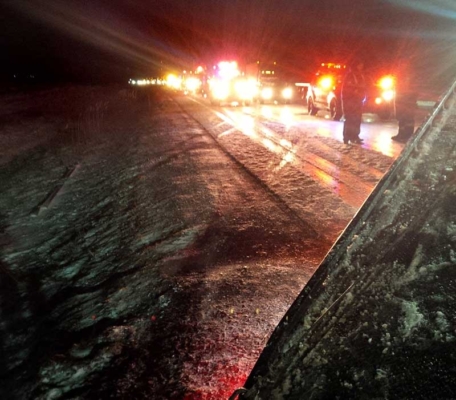
Emergency vehicles stopped on the icy roadway on Highway 401. SPECIAL TO POSTMEDIA
Waterways that should have been frozen were overflowing, causing minor flooding. The new culvert extension couldn’t keep up with the water flowing from the fields, and the hole and trench dug beside the new structure filled up to the top.
Ashlyn’s car left the road at full tilt at a sharp angle, careening down the slippery slope and slamming into the culvert on the driver’s side, smashing glass and crushing in her door, leaving her with mere centimetres of space on that side.
The force of the collision was so strong, the car managed to flip over on its end, in some mechanical pirouette, and land perfectly upside down into that hole with the driver’s side closest to the cement abutment.
It was a one-in-a-million shot — like a hole-in-one or a tricky eight ball in the side pocket.
The car was a perfect fit for the hole, like a hot dog in a bun.
Had Ashlyn gone off the road 10 metres sooner or later, she would have glided into the ditch with little or no damage to her car and likely ended up with only jangled nerves.
The tow truck, which Reintjes and the driver with the flat tire were awaiting on Westchester Bourne, rolled up when the call came over the dispatch.
“Possible p.i. Rollover.” A personal injury rollover crash near Veterans Memorial Parkway, the next cut-off west of Reintjes’ location.
The call came into OPP dispatch at 9:52 p.m.
“You’re good,” he told the driver, before he took off in the SUV and made a left onto the on-ramp with full lights and sirens.
When I saw those headlights under the murky water and they were just faint — that was a terrifying thing. For a second in my head, there’s that dream.
OPP Det. Peter Reintjes
It took less than two minutes to get down the road. “It’s pitch black, it’s really dark,” he said. “I just see the witness out of the corner of my eye and I hit the brakes and slid by him by about 100 yards.”
Reintjes backed up and got out. Wiechers, who was likely in shock, was “calmly standing at the side of the road.”
“So, I said something ridiculous to him like ‘How’s it going?’ He said ‘good.’” Reintjes said.
“I said ‘where’s the car?’”
Wiechers pointed down into the ditch towards the hole and the overturned car. “Over there.”
Reintjes shone his flashlight down the slope and saw the car — its dim headlights glowing hazily in the dirty water.
Like Indiana Jones, even grizzled cops and soldiers have fears and phobias. Reintjes has two. One is spiders. The other is murky water.
When he was a kid, he had a vivid dream, he said, about one of his classmates diving into water and hitting her head on the pier. “Last I saw was her body floating down in the murky water.”
“When I saw those headlights under the murky water and they were just faint — that was a terrifying thing. For a second in my head, there’s that dream.”
Reintjes turned to Wiechers. “Where are the people?” he asked.
Wiechers said he didn’t know. He’d seen the car go off the road. He didn’t see any people.
“Then they’re in there!” Reintjes yelled, before tearing down the ditch and “going for a swim.”
Any other police officer working that night knew that something serious was going on just by the tone of OPP Det. Peter Reintjes’ voice over the radio. There was a lot of chatter on the portables on Feb. 12, 2017, with officers relaying back the status of the calls that had piled up once the temperature dropped, the rain turned to snow and the road iced up.
Reintjes — standing in the bitter cold along the roadside near the Veterans Memorial Parkway exit with Tim Wiechers, the witness who had seen the car go off the road at the side of the highway — needed to find a clear channel to get help.
“Break, break, break!” he yelled, referring back to his army-speak as a reservist and what he would say when he was in a war zone.
“Vehicle submerged. People are trapped inside.”
Down in the ditch, 28-year-old Ashlyn Krell was trapped in a damaged car that was submerged upside down in an unforeseen pool of open water. Her chances of rescue decreased with every tick of the clock.
He wanted the fire department, ambulances and especially gave instructions to tell the tow trucks in the area to drop everything.
“Send everybody!” he bellowed.
Reintjes knew his tone was elevated. “I was almost panicky because I knew we had a situation here . . . It was that feeling of helplessness.”
Police officers and other emergency personnel know that feeling well. There are situations, despite the long odds of success, where “you do the best you can and at the end of the day, you say I did the best job I could with that call.
“When you can’t do anything, that’s the one that haunts you. . . . This was a case of there was nothing I could do, really. I was going to try everything I could but as it went on, I realized it was helpless to the point you almost give up.”
Reintjes wasn’t quite at that point when he made the call.
“I knew this was going to be crazy. I gave the radio transmission and made sure someone heard it, because I knew I was going for a swim.”
Reintjes pulled off the body armour vest that holds his radio, his only portable way to communicate with fellow officers, and tossed it aside. He took off his gun belt and threw it into the back seat of the marked SUV.
Then he pulled open the back hatch to search for any tool that might help him. He opened the breaching kit. He threw aside the battering ram. It slid away along the ice at the side of the road.
He chose the pry bar and the “hooligan” tool, a device used to open up car door locks, thinking that maybe he could jimmy open one of the doors.
When you can’t do anything, that’s the one that haunts you.
Det. Peter Reintjes


